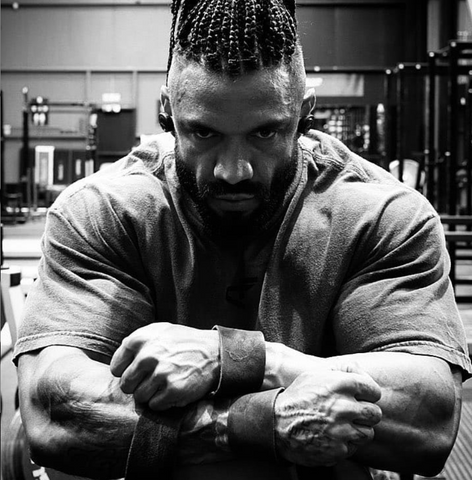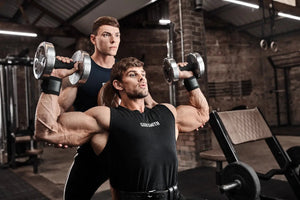
Should You Be Wearing Lifting Straps as a Beginner?
Should you be wearing lifting straps in the gym as a beginner, or even an intermediate or advanced lifter?
What do lifting straps even do, and are they a safer way to train?
I’m sure everyone reading this has seen someone in the gym, fresh off of pulling a new PR on the deadlift, with a couple of lifting straps hanging from their wrists.
If you watched the preceding lift, you’ll have noticed the lifter approach the bar like normal, and then wrap the lifting straps around the bar before lifting.
After wrapping the strap tightly, the lifter will grip the strap and increase the tension of the lifting strap, which allows him to pull greater weight.
How does all of this happen, and is it really beneficial to lifting or just another gimmick?
What is the purpose of the lifting strap?
The lifting strap, or wrist strap, is one of the most common weight lifting accessories, and many people consider them as being essential to their safety.
You see, strapping on a pair of lifting straps makes it easier to lift heavier weight. They also practically guarantee that you won’t be dropping the barbell or dumbbells, which could lead to a serious injury.
Wrist straps are often used by bodybuilders, powerlifters and strongman athletes, but the casual lifter can find some use in the lifting straps as well.
If you plan on using lifting straps in the gym, it’s important to know how and when to use them.

What are lifting straps?
Lifting straps are pieces of cloth or leather, that form a loop around your wrist and then are wrapped around the bar.
They are usually 1”-1.5” thick and made of canvas or nylon, but higher-quality straps are often made of leather and are a bit thicker.
Check out some of our Premium 2” Leather Lifting Straps here!
When you use a pair of lifting straps, you’re essentially attaching the barbell directly to your wrist, completely circumventing the need for a strong grip. They remove pressure from the hands and send it directly to the forearm.
While this isn’t good for building/increasing your grip strength, it will allow you to lift more without fatiguing your grip, as the grip is usually the first thing to fail when lifting heavy.
It’s important to know how to use the lifting straps before using them, and to practice a few times on the barbell to get the motion down for tightening them.

How do I use lifting straps?
While they may seem simple and intuitive, many people have challenges when first trying to use lifting straps. Read below to learn the right way to use your lifting straps.
- Place the straight end through the looped end
- Put your hand through the circle formed by the lifting strap.
- Position the loose end of the strap between your pointer finger and your thumb.
- Wrap the loose end of the strap ONCE around the barbell or dumbbell.
- Be sure to wrap UNDER the bar, and then loop it back towards yourself.
- Use your free hand to tighten the strap.
- Twist the strap and bar in order to remove all the slack from the wrist strap.
- Do the same on the other hand, and prepare to lift.

Should I buy a pair of Lifting Straps?
One of the main purposes of the lifting straps is that they allow you to focus on the pulling phase of your lift, while not being distracted by the potential for you grip to fail.
As you progress through your workout, you’ll notice some muscles begin to feel fatigued before others. Often times, during heavy ‘pull’ exercises, the first muscle group to fade will be your forearms, which effects your grip.
As your grip strength lessens due to fatigue, the chance of sacrificing form increases, which can lead to injury.
This is the beauty of lifting straps: they allow us to continue with our workout, even after our grip has faded.
If you want to be able to push yourself further, while also maintaining proper form, look into getting a pair of lifting straps.

When should I use my lifting straps?
Lifting straps are best utilized on ‘pull’ exercises, such as the deadlift, rows or lat pulls. They should be avoided for anything where the weight will be above you, such as the overhead press or bench press, or any lifts where you may need to drop the weight quickly. These include snatches, clean and jerks, and squats.
You’ll also want to save your lifting straps for when you really need them, when you’re getting close to breaking a 1 Rep Max or feel your grip getting too tired.

Is there any better alternative to lifting straps?
This article wouldn’t be complete without going over one of the latest accessories to be found in the gym, which promises to replace wrist straps and gloves in one product: the Power Grip.
Power Grips work in the same way that lifting straps do, but are much easier to use and therefore less prone to slipping from mistakes.
Power Grips have all the benefits of lifting straps as well, but with the added support of a wrist strap to stabilize the wrist joint.
They also add a layer of protection between the bar and your hand, protecting your skin from torn calluses and eliminating the need for gloves.
Because the Power Grip doesn’t have such a complete wrap around the barbell like the lifting strap, they’re actually safer because you can drop the weight at a moment’s notice. They also come in handy for many other exercises and protect your hands.

Conclusion
While many beginners may think they need to use lifting straps, it’s actually unlikely that you will be lifting enough to benefit from using straps. It is usually recommended to wait until 3 months of lifting to allow your grip strength to improve before using straps or Power Grips.
Intermediate lifters can use straps on most pull exercises, but due to safety concerns they should be avoided on certain overhead movements. Power Grips can be used safely on both push and pull exercises.
Advanced lifters can do whatever the hell they want.
Now that you’re armed with the proper information, check out our Premium Leather Lifting Straps or Power Grips to help you reach your weight training goals.





